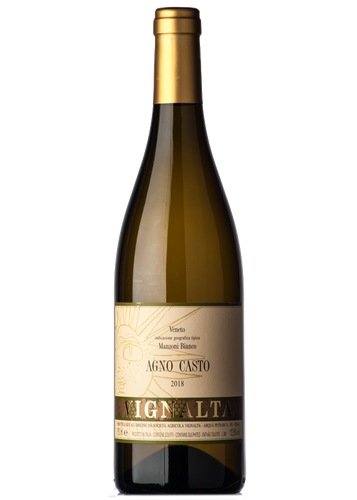The Manzoni Bianco is the best known of the crossbreedings developed by Professor Luigi Manzoni of the Conegliano Wine School starting from the 1920s, and is the child of the union between Rgine Riesling and Pinot Bianco. The Vignalta interpretation, named after Agno Casto, is without a shadow of a doubt one of the most convincing, thanks to the volcanic and limestone terroir of the Euganean Hills, near Padua, which gives this naturally aromatic and structured variety that something extra in terms of minerality and sapid vigour.
Vignalta is a winery that needs no introduction. It is to this winery, and to the foresight of characters such as Lucio Gomiero, Luciano Salvagnin and Paolo Guzzo, that the development of the Euganean Hills is due. On these hills, which Petrarca and Foscolo immortalised with their extraordinary verses, some of the greatest Bordeaux blends in Italy are made. The reason? The perfect exposition of the numerous crus of these hills, which stand out, unique, from the Venetian plain, and which have prevailing volcanic origin. Body, wealth and minerality in bucket-fulls, therefore.
Vignalta rises in the southern area of the Euganean Hills, generally considered the best performing. The vineyards, which have their epicentre in Arquà, are however scattered throughout the denomination, and from that of Faedo, the centre of the DOC, at the foot of Mount Venda, comes Manzoni, which is perhaps the most significant white in the winery’s range.
Straw yellow in colour, which is somewhat intense, already its colour suggests its own aromatic temperament. Which is definitely vegetable, with hints of aromatic herbs, sage, thyme, oregano, but is also floral, with hints of acacia, fruity, with a citrusy edge. On the palate Agno Casto turns out to be structured and of good pseudo-heat, but without being tiring. The acidity, in fact, gallops along, flanked by the flavour that the volcanic terroir had promised. It is a generous wine, and overall it is enveloping and fruity, with retronasal flavours of peach and pineapple. It closes with a very long persistence, with a sharp ending, which reveals the natural complexity of the vine, as Agno Casto - it is worthwhile remembering - ages exclusively in steel, for about six months.











